August 20, 2024
M. Leja Receives Recognition in South Africa for Support in Science
On August 16-17, 2024, the 1st International African Helicobacter and Microbiota Study Group (AHMSG) Inaugural Conference took place in Cape Town, South Africa. During the event, recognition was awarded to four scientists for their support, one of whom was Mārcis Leja, Director of the Institute of Clinical and Preventive Medicine at the University of Latvia.
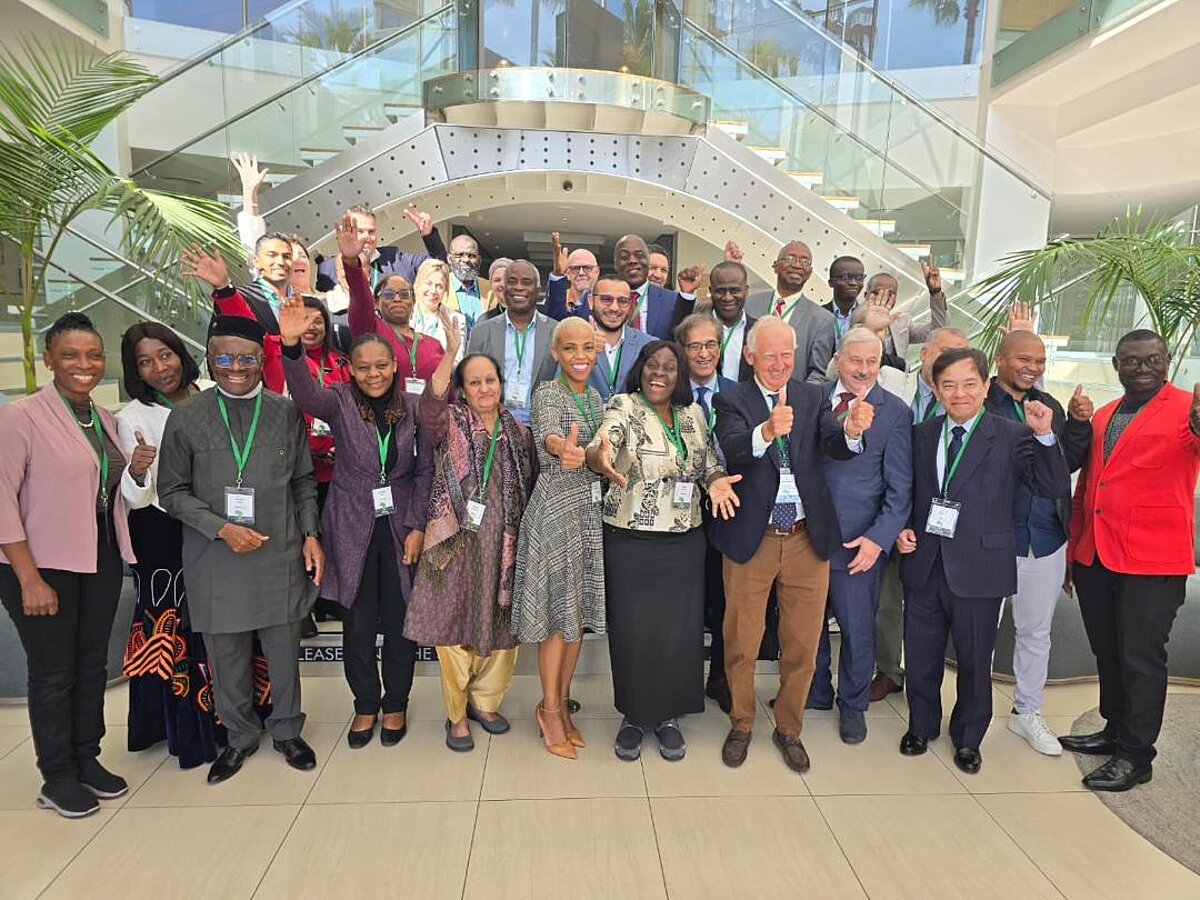

This group was established two years ago in Nigeria, following the good experience of Europe, specifically modeled after the European Helicobacter and Microbiota Study Group. Two representatives from the European group, including one from Latvia, Professor Mārcis Leja, participated in its founding. Following the group's establishment, work began on developing the first African guidelines, with European representatives also participating in this effort.
The document was published earlier this year in the journal Digestive Diseases. This year, the conference saw broader representation from countries outside Africa, including scientists from Japan and the United States. The authors of the group's initiatives awarded their recognition to four guests for their support of the African countries' initiative, one of whom was M. Leja. The experience, including that of Latvia, which experts are ready to share with specialists on the African continent, was discussed. In his report, M. Leja provided an overview of the progress of the GISTAR, Eurohelican, TOGAS, and EUCanSCreen projects.
August 1, 2024
One of the stages of the GISTAR study led by the Institute of Clinical and Preventive Medicine of the University of Latvia was successfully implemented in Saldus, 548 participants were surveyed

The research center in Saldu was opened for the first time in 2015, nine years later the research center was opened for the second time, where 548 GISTAR participants came to the survey by the end of July 2024.
Various types of information were collected from the study participants about the events of the digestive system, heart and metabolic diseases since the first visit, lifestyle and eating habits and many other questions.
The GISTAR study is unique not only in Latvia, but also in Europe, and it has gained international attention. Some of the participants in the GISTAR study had received a course of treatment to eradicate H. pylori - now a special breath test was performed at the research centers to determine whether the eradication was successful. Blood tests were taken for all participants, in which various parameters related to inflammation and metabolism will be determined in the near future. These analyzes will also be performed on samples taken from participants nine years ago and stored frozen in the laboratory. The results of the old and new analyzes will be compared. Whether there is any relationship between changes in assays and health-related events with the use of H. pylori eradication medication will be investigated. It will also be evaluated whether there are any connections with the fact that the H. pylori infection is not treated.
All participants were offered a fecal immunochemical test to detect the presence of occult blood in the stool, and those who tested positive were advised to undergo a colonoscopy, or colon examination. During this examination, polyps or formations can be detected, the removal of which reduces the risk of developing colon cancer.
Researcher of the Institute of Clinical and Preventive Medicine of the University of Latvia, gastroenterologist Dr. med Danute Ražuka-Ebela says: "From the spring of 2023, the research centers in Ludza, Alūksne, Cēsis and Saldu have started and finished their operations, where GISTAR participants included in the study from 2014 and 2015 have been invited to the survey. Currently, the center in Rēzekne continues to operate. In total, more than 2,000 people came to the survey in the research centers (Ludzā 546, Alūksne 331, Cēsīs 332, Saldū 548, Rēzekne 340). Extensive work with the data and its analysis is currently underway. We are very grateful to the research participants for the time invested in the name of a common goal."
About GISTAR: A multicenter randomized trial to reduce gastric cancer mortality by H. pylori eradication and pepsinogen measurement. The study has been ongoing in Latvia since 2013.
The project "Accelerating the reduction of stomach cancer in Europe by eradicating H. pylori" (abbreviated as EUROHELICAN) is a project supported by the EU program "EU for Health" (EU4Health). As part of this, a population-based strategy for H. pylori testing and eradication is being evaluated. Infection with H. pylori significantly increases the risk of developing stomach cancer: most cases of stomach cancer are related to this infection. The project evaluates the use of the H. pylori testing and eradication strategy at the population level and various aspects of the strategy. The use of this strategy among young people is being studied in Slovenia. In Latvia, the long-term effects of this strategy are evaluated by surveying the participants of the GISTAR study.
In Latvia, the EUROHELICAN project is led by the Institute of Clinical and Preventive Medicine of the University of Latvia in cooperation with the National Institute of Public Health of Slovenia (The National Institute of Public Health - NIJZ), the International Agency for Research on Cancer of the World Health Organization (IARC) /WHO France), Nantes University Hospital (Nantes University Hospital, France) and Maribor Dr. Community Healthcare Center Dr. Adolf Drolc Maribor, Slovenia. The project will continue until the end of April 2025.

More about project EUROHELICAN: www.kpmi.lu.lv/petnieciba/petniecibas-projekti/eurohelican/
July 9, 2024
TOGAS research is being launched for the first time in Latvia, the first center has been opened in Rēzekne
The Institute of Clinical and Preventive Medicine of the University of Latvia, which is the leading partner of the study TOGAS - Towards Gastric Cancer screening in the European Union, launched the study "Detection and treatment of Helicobacter pylori infection in the population of young people" in Rēzekne.

Photo: Matīss Markovskis
The study will last until 01.04.2026. for the year. It is planned to include 300-400 participants aged 30-34.
"The goal of the TOGAS project is to develop recommendations for the introduction of gastric cancer screening in EU countries. In order to achieve this, three large-scale pilot studies are being conducted, with the help of which various aspects of gastric cancer screening and early diagnosis are being developed within 36 months," said Linda Mežmale, researcher at LU KPMI.
This type of research is needed because there is currently a lack of effective gastric cancer screening methods in Europe. Current research shows that the eradication of Helicobacter pylori, a bacteria that lives in the stomach and promotes the development of stomach cancer, could reduce the number of deaths caused by stomach cancer by as much as 40%, so it is important to find ways to implement this prevention in practice.
The pilot study - "Detection and treatment of Helicobacter pylori infection in the young population" is part of the international project "Towards Gastric Cancer Screening Implementation in the European Union, TOGAS", which aims to develop recommendations for gastric cancer screening for implementation in European Union (EU) countries. This pilot study will be implemented not only in Latvia, but also in other EU countries (Slovenia, Ireland, Croatia, Poland, Romania).
The aim of the study is to evaluate a population-based H. pylori test-and-treat strategy in a young population for gastric cancer prevention.
During the research, it is planned to detect H. pylori and eradicate the bacterium in a group of young people aged 30-34 years. Based on the obtained results, the participation level of the invited individuals in the study will be analyzed, the H. pylori eradication therapy and its side effects will be evaluated. The results of this study will provide essential information needed for the development and implementation of a gastric cancer screening program strategy in the European Union. Experts from the World Health Organization's International Agency for Research on Cancer will develop recommendations for the implementation of gastric cancer prevention measures and their effectiveness evaluation at the European level. The established guidelines and recommendations will help European countries to include these gastric cancer prevention measures in their health care priorities.

The project "Towards Gastric Cancer Screening Implementation in the European Union" (TOGAS) has received funding from the EU4Health program of the European Union in accordance with grant agreement no. 101101252.
The views and opinions expressed here reflect the views of the author(s) only and do not reflect the position of the European Union or the European Health and Digital Executive Agency (HaDEA). The European Union and the funding authority are not responsible for them.
March 27, 2024
As part of the EUROHELICAN project, the GISTAR research center was opened in Rēzekne, where training was also held for future employees of the center


GISTAR is a multicenter randomized study to reduce mortality caused by gastric cancer by eradicating H. pylori and determining the level of pepsinogen, which has been taking place in Latvia since 2013.
The GISTAR study is unique in Europe and has also gained international attention. A survey of its participants is currently underway within the framework of the EUROHELICAN project supported by the European Commission's "EU Health" (EU4HEALTH) program and in the near future also within the TOGAS project.
"Data from the GISTAR study will provide essential information needed to develop gastric cancer prevention strategies in Europe. In total, more than 11,000 participants in different regions of Latvia are involved in the study. It is important that participants come to the survey, which is currently underway, because comparing the information that will be obtained now with that obtained 5 to 10 years ago, new opportunities open up to find answers to questions that are relevant not only in Europe, but also throughout in the world," said the researcher of the Institute of Clinical and Preventive Medicine of the University of Latvia, Dr. med. Danute Ražuk-Ebela.
During the training, the new employees were introduced to the research website, data use and security rules, GISTAR data management system, research protocol, procedure for inclusion of research participants and learning of all standard procedures in practice.
On March 27, the scientific leader of the GISTAR study, director of the Institute of Clinical and Preventive Medicine of the University of Latvia (LU KPMI), gastroenterologist and professor of the University of Latvia, Mārcis Leja, gave a lecture in the Microsoft Teams environment on the possibilities of reducing stomach cancer mortality and the European perspective on these issues.
LU KPMI leading researcher Dr.sc.ing. Sergejs Parshutins introduced the center's employees to data entry systems, security rules and data storage conditions, while LU KPMI senior expert Aiga Rūdule informed them about the special requirements of the EU4Health program and the EUROHELICAN project, the achievable results and quality control, as well as the design, goals and tasks of the GISTAR study .
The project "Accelerating the reduction of the spread of stomach cancer in Europe by eradicating H.pylori", or EUROHELICAN for short, is a project supported by the EU program EU - Health (EU4Health). As part of this, a population-based H.pylori testing and eradication strategy will be evaluated. On the other hand, in Latvia, based on the previously conducted research, an analysis of the long-term impact of the H.pylori testing and eradication strategy is being carried out.
It is expected that the results obtained during the project will help experts to develop guidelines and policy makers to incorporate H.pylori testing and eradication strategy into health care priorities, thus reducing the incidence of gastric cancer in Europe.
In Latvia, the project is implemented by the Institute of Clinical and Preventive Medicine of the University of Latvia (LU KPMI). Main cooperation partners: The National Institute of Public Health of Slovenia (The National Institute of Public Health - NIJZ), the International Agency for Research on Cancer of the World Health Organization (IARC/WHO France), Nantes University Hospital ( Nantes University Hospital, France) and Maribor Dr. Community Healthcare Center dr. Adolf Drolc Maribor, Slovenia. The project will continue until the end of April 2025.
More information: https://www.gistar.eu/S%C4%81kums/Par-Gistar
Healthy individuals between the ages of 40 and 64 were invited to voluntarily participate in the scientific project, which was launched in 2013. Participants were randomly assigned to control and intervention groups. Participants filled out a questionnaire that collects baseline indicators, lifestyle habits, as well as medical history. The presence of H. pylori infection and pepsinogens in blood tests were determined in the participants of the intervention group. Participants with H. pylori infection were offered eradication of the bacterium. Those with decreased pepsinogen levels (indicating possible changes in the stomach lining associated with an increased risk of developing cancer) were offered an upper endoscopy, or gastroscopy. All study participants were offered a fecal occult blood test for colorectal cancer screening and, in case of a positive test, these individuals were invited for a colonoscopy. More than 10 years have passed since the first participant was included, and the survey of participants is currently underway.
Colorectal (colon and rectal) cancer and stomach cancer are the most common tumors of the digestive system. Many of the cancers can be prevented by early detection of changes or precancerous conditions associated with a higher risk of developing cancer. Likewise, if the malignant process is detected early, it is still possible to successfully cure it.
Digestive system tumors account for a large proportion of the total number of tumors worldwide, with 3.88 million new cases diagnosed each year and 2.83 million deaths from digestive system tumors each year.
About project EUROHELICAN - https://www.kpmi.lu.lv/petnieciba/petniecibas-projekti/eurohelican/

February 29, 2024. The operation of the GISTAR research center in Cēsis has been successfully completed


On February 29 of this year, within the framework of the EUROHELICAN project, the survey of participants in the GISTAR study ended in Cēsis. A total of 341 participants were surveyed in the research center in Cēsis, and so far - 1227 GISTAR participants in total.
The research is carried out within the framework of the international project "Accelerating gastric cancer reduction in Europe through H.pylori eradication" (EUROHELICAN for short). EUROHELICAN is a project supported by the EU program for EU health (EU4Health). within the framework, a population-based strategy for H.pylori testing and eradication will be evaluated. In Slovenia, H.pylori testing and eradication of the bacterium is carried out in the population group aged 30-34. Whereas in Latvia, based on previously conducted research, H.pylori testing and bacterium eradication is carried out analysis of the long-term impact of the eradication strategy.
The results obtained during the project will help experts to develop guidelines and policy makers to incorporate H.pylori testing and eradication strategy into healthcare priorities, thereby reducing the incidence of stomach cancer in Europe.
In Latvia, the project is implemented by the Institute of Clinical and Preventive Medicine of the University of Latvia (LU KPMI). Main cooperation partners: The National Institute of Public Health of Slovenia (The National Institute of Public Health - NIJZ), the International Agency for Research on Cancer of the World Health Organization (IARC/WHO France), Nantes University Hospital ( Nantes University Hospital, France) and Maribor Dr. Community Healthcare Center dr. Adolf Drolc Maribor, Slovenia. The project will continue until the end of April 2025.
More about the EUROHELICAN project - https://www.kpmi.lu.lv/petnieciba/petniecibas-projekti/eurohelican/
The views and opinions expressed here reflect the views of the author(s) only and do not reflect the position of the European Union or the European Health and Digital Executive Agency (HaDEA). The European Union and the funding authority are not responsible for them.

The project has received funding from the EU4Health program of the European Union in accordance with grant agreement no. 101079944
December 15, 2023. The survey of patients in the EUROHELICAN project was successfully completed in Alūksne
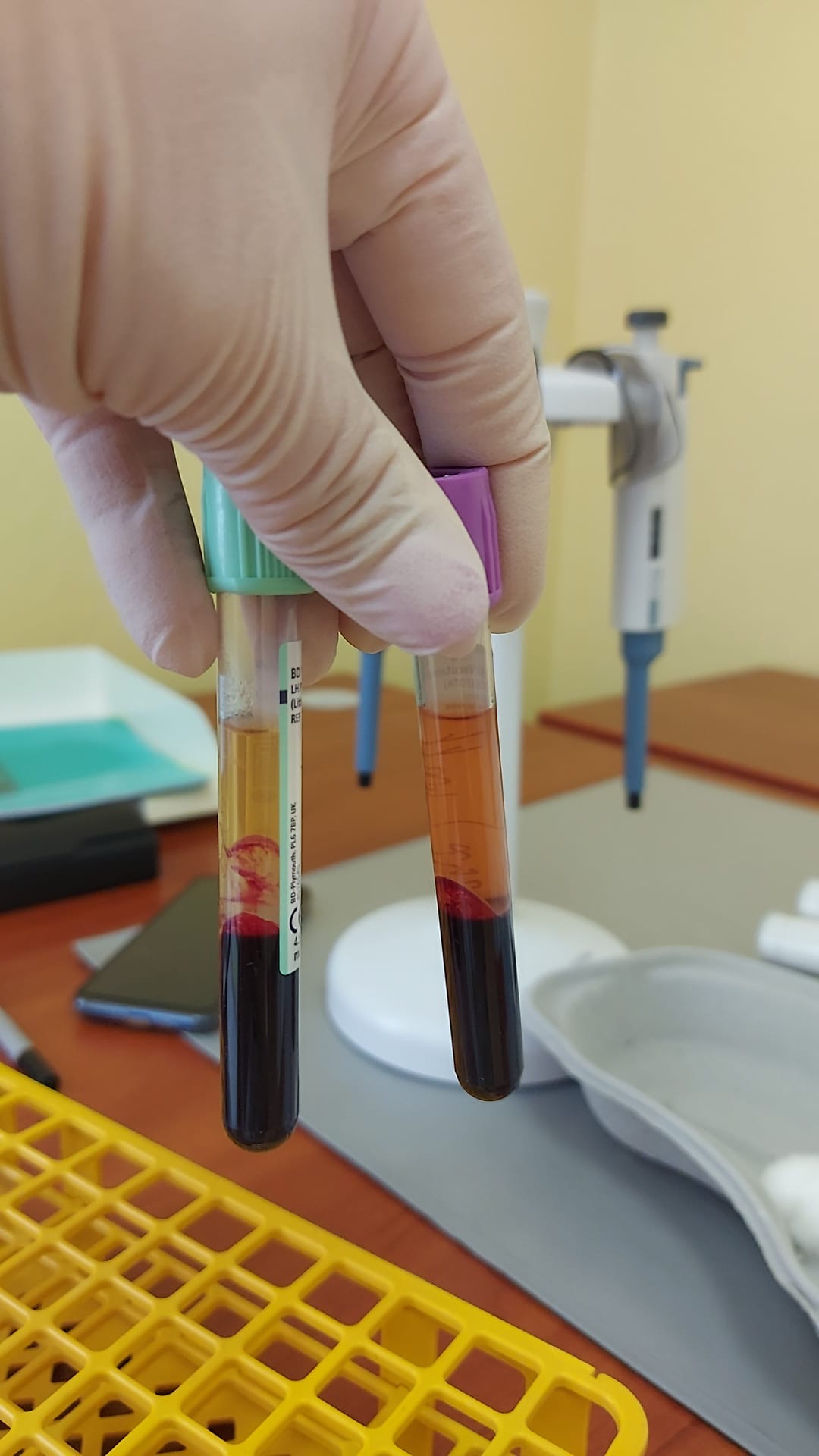
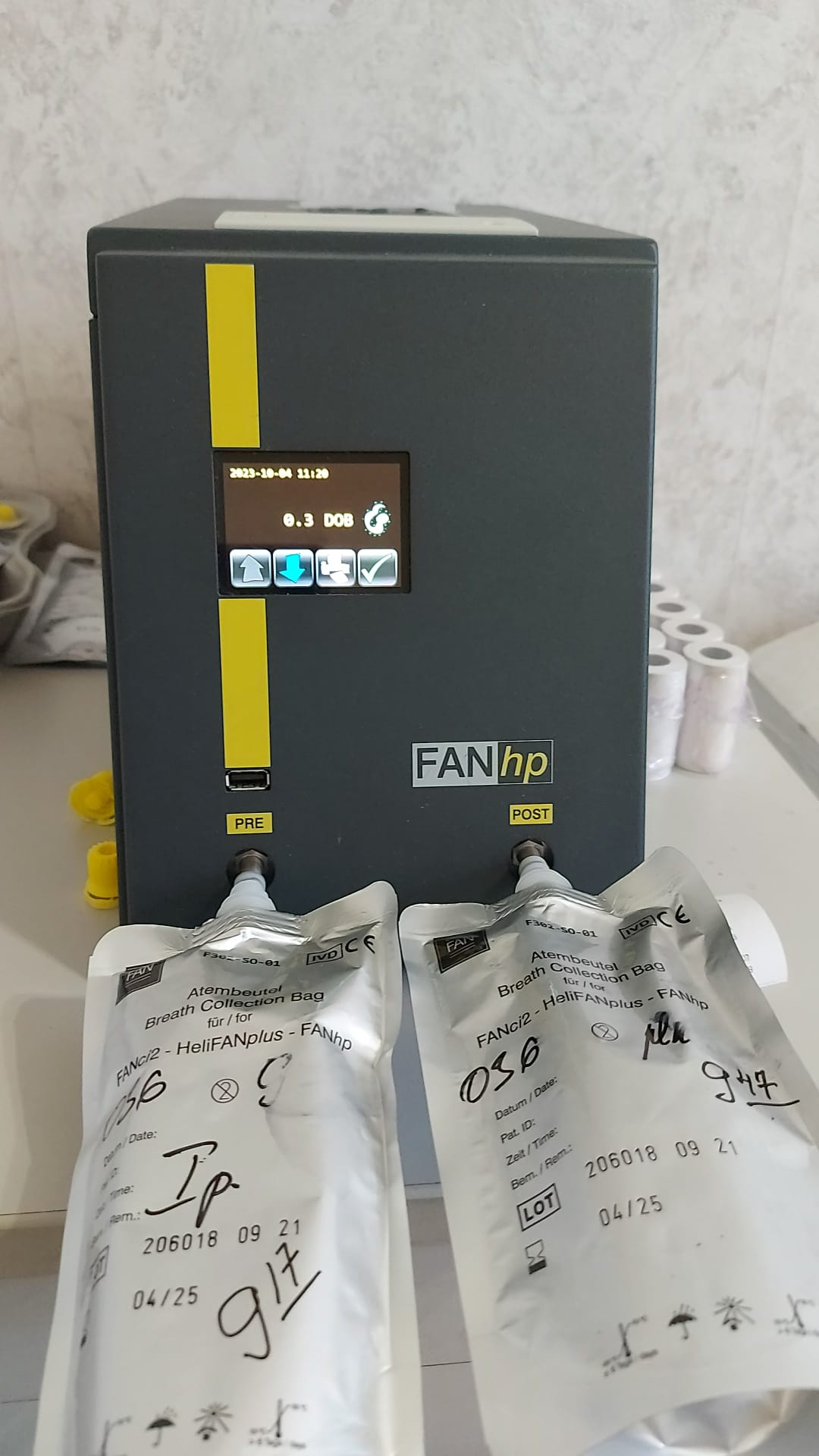
In the Alūksne research center, which was opened by the Institute of Clinical and Preventive Medicine of the University of Latvia on September 14, 2023, 340 patients were examined until mid-December.
The project "Accelerating the reduction of the spread of stomach cancer in Europe by eradicating H. pylori", or EUROHELICAN for short, is a project supported by the EU program EU - Health (EU4Health). As part of this, a population-based strategy for testing and eradicating the bacterium H. pylori will be evaluated. Infection with Helicobacter pylori or H. pylori significantly increases the risk of developing stomach cancer - most cases of stomach cancer are related to this infection. As a result of the project, world and European experts will develop recommendations for the implementation of gastric cancer prevention measures and for evaluating their effectiveness.
The researcher of the Institute of Clinical and Preventive Medicine of the University of Latvia, gastroenterologist Dr. med Danute Ražuka-Ebela said that this year the survey of the participants of the GISTAR study, which has been ongoing for 10 years, was started in three Latvian cities: in 2014. The work is currently being continued by the research center in Cēsis. 1150 people were surveyed within the project. We are very grateful to the research participants for the time invested in the name of a common goal."
On the other hand, in 2024, research centers will start working in other Latvian cities as well.
In Latvia, the EUROHELICAN project is led by the Institute of Clinical and Preventive Medicine of the University of Latvia (LU KPMI) in cooperation with the National Institute of Public Health of Slovenia (The National Institute of Public Health - NIJZ), the International Agency for Research on Cancer of the World Health Organization - IARC/WHO France), Nantes University Hospital (Nantes University Hospital, France) and Maribor Dr. Community Healthcare Center dr. Adolf Drolc Maribor, Slovenia. The project will continue until the end of April 2025.

The views and opinions expressed here reflect the views of the author(s) only and do not reflect the position of the European Union or the European Health and Digital Executive Agency (HaDEA). The European Union and the funding authority are not responsible for them.
If representatives of the International Agency for Research on Cancer / World Health Organization ((International Agency for Research on Cancer (IARC) / World Health Organization (WHO)) are indicated as the author of the publication, they are individually responsible for the opinions expressed, and they do not always reflect those of the International Agency for Research on Cancer (IARC) / World Health Organization (WHO)). research agency decisions, policies or positions.
The project has received funding from the EU4Health program of the European Union in accordance with grant agreement no. 101079944.
November 2, 2023. The GISTAR research center is opened in Cesis and trainings are held for future research workers
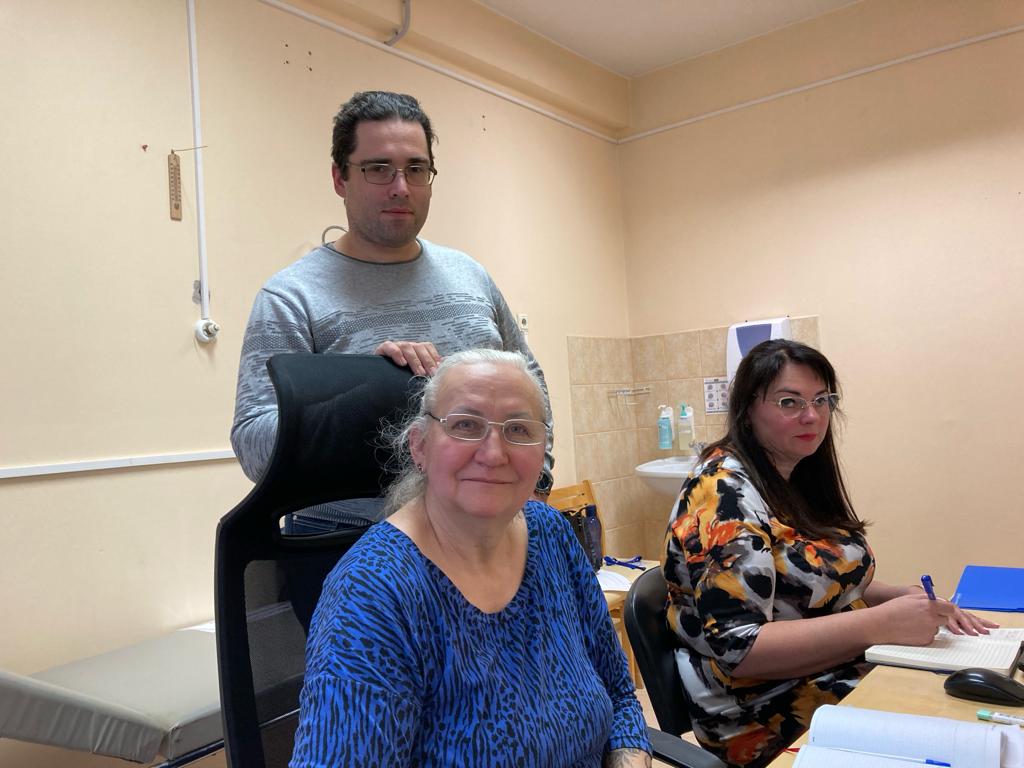
On November 1 the GISTAR research center was opened in Cēsis, where training was held for the future employees of the center. GISTAR is a multicenter randomized trial to reduce gastric cancer mortality by H.pylori eradication and pepsinogen measurement.
During the training, the new employees were introduced to the research website, data use and security rules, GISTAR data management system, research protocol, procedure for inclusion of research participants and learning all standard procedures in practice.
On October 26, in the Microsoft Teams environment, a lecture was given by the scientific leader of the GISTAR project, director of the Institute of Clinical and Preventive Medicine of the University of Latvia (LU KPMI), gastroenterologist and professor of the University of Latvia, Mārcis Leja, in the Microsoft Teams environment.
LU KPMI leading researcher Dr.sc.ing. Sergejs Parshutins introduced the center's employees to data entry systems, security rules and data storage conditions, while LU KPMI senior expert Aiga Rūdule informed them about the special requirements, achievable results and quality control of the EU4Health program and EUROHELICAN project, as well as about the design, goals and objectives of the GISTAR study .
The project "Accelerating the reduction of the spread of stomach cancer in Europe by eradicating H. pylori", or EUROHELICAN for short, is a project supported by the EU program EU - Health (EU4Health). As part of this, a population-based H.pylori testing and eradication strategy will be evaluated. As a result of the project, global and European experts will develop guidelines for the implementation of gastric cancer screening and recommendations for evaluating its effectiveness. In Latvia, it is managed by the Institute of Clinical and Preventive Medicine of the University of Latvia (LU KPMI) in cooperation with the National Institute of Public Health of Slovenia (The National Institute of Public Health - NIJZ), the International Agency for Research on Cancer of the World Health Organization Organizations - IARC/WHO France), Nantes University Hospital (Nantes University Hospital, France) and Maribor Dr. Community Healthcare Center dr. Adolf Drolc Maribor, Slovenia. The project will continue until the end of April 2025.
More about the EUROHELICAN project - https://www.kpmi.lu.lv/lv-lv/petijumi-un-projekti/eurohelican

The views and opinions expressed here reflect the views of the author(s) only and do not reflect the position of the European Union or the European Health and Digital Executive Agency (HaDEA). The European Union and the funding authority are not responsible for them.
If representatives of the International Agency for Research on Cancer / World Health Organization ((International Agency for Research on Cancer (IARC) / World Health Organization (WHO)) are indicated as the author of the publication, they are individually responsible for the opinions expressed, and they do not always reflect those of the International Agency for Research on Cancer (IARC) / World Health Organization (WHO)). research agency decisions, policies or positions.
The project has received funding from the EU4Health program of the European Union in accordance with grant agreement no. 101079944
September 14, 2023. GISTAR research center is opened in Alūksne and trainings are held for future research workers
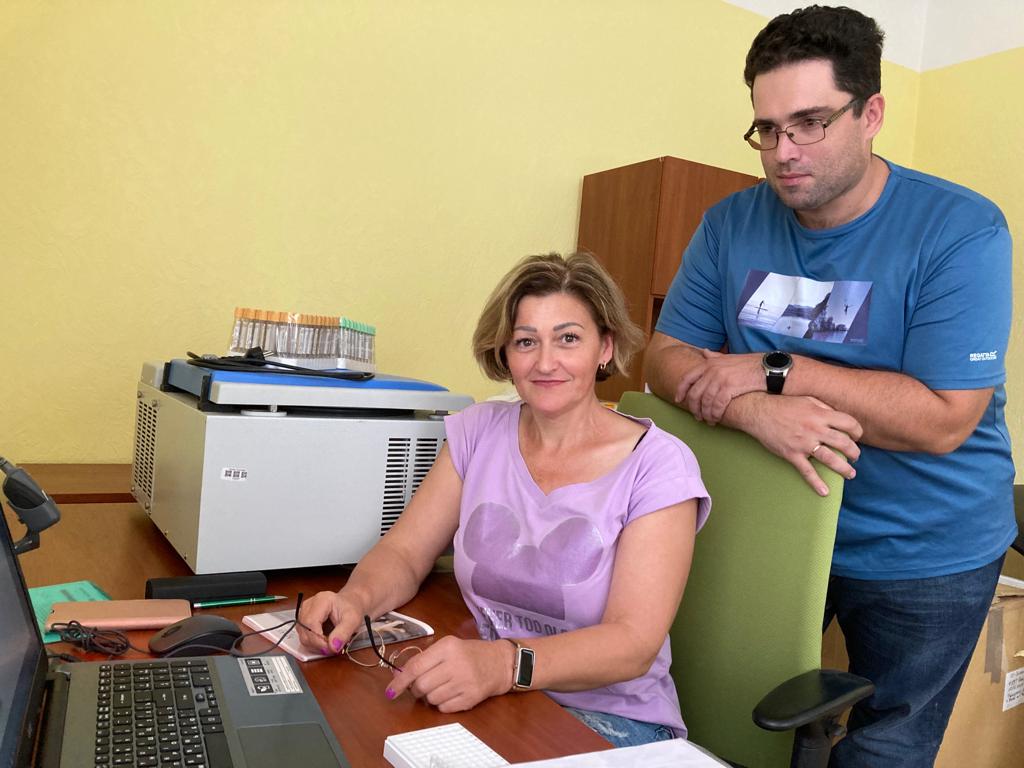
On September 14 the GISTAR research center was opened in Alūksne, where training was held for the future employees of the center. GISTAR is a multicenter randomized trial to reduce gastric cancer mortality by H.pylori eradication and pepsinogen measurement.
During the training, the new employees were introduced to the research website, data use and security rules, GISTAR data management system, research protocol, procedure for inclusion of research participants and learning all standard procedures in practice.
On September 14, in the Microsoft Teams environment, a lecture was given by the scientific leader of the GISTAR project, director of the Institute of Clinical and Preventive Medicine of the University of Latvia (LU KPMI), gastroenterologist and professor of the University of Latvia Mārcis Leja, as well as other LU KPMI employees.
The project "Accelerating gastric cancer reduction in Europe through Helicobacter pylori eradication", or EUROHELICAN for short, is a project supported by the EU program EU - Health (EU4Health). As part of this, a population-based strategy for testing and eradicating the bacterium Helicobacter pylori will be evaluated. As a result of the project, global and European experts will develop guidelines for the implementation of gastric cancer screening and recommendations for evaluating its effectiveness. In Latvia, it is managed by the Institute of Clinical and Preventive Medicine of the University of Latvia (LU KPMI) in cooperation with the National Institute of Public Health of Slovenia (The National Institute of Public Health - NIJZ), the International Agency for Research on Cancer of the World Health Organization Organizations - IARC/WHO France), Nantes University Hospital (Nantes University Hospital, France) and Maribor Dr. Community Healthcare Center dr. Adolf Drolc Maribor, Slovenia. The project will continue until the end of April 2025.
More about the EUROHELICAN project - https://www.kpmi.lu.lv/lv-lv/petijumi-un-projekti/eurohelican

The views and opinions expressed here reflect the views of the author(s) only and do not reflect the position of the European Union or the European Health and Digital Executive Agency (HaDEA). The European Union and the funding authority are not responsible for them.
If representatives of the International Agency for Research on Cancer / World Health Organization ((International Agency for Research on Cancer (IARC) / World Health Organization (WHO)) are indicated as the author of the publication, they are individually responsible for the opinions expressed, and they do not always reflect those of the International Agency for Research on Cancer (IARC) / World Health Organization (WHO)). research agency decisions, policies or positions.
The project has received funding from the EU4Health program of the European Union in accordance with grant agreement no. 101079944
August 28, 2023. Successfully completed clinical activities of the HYCOR project at the Liepāja Research Center
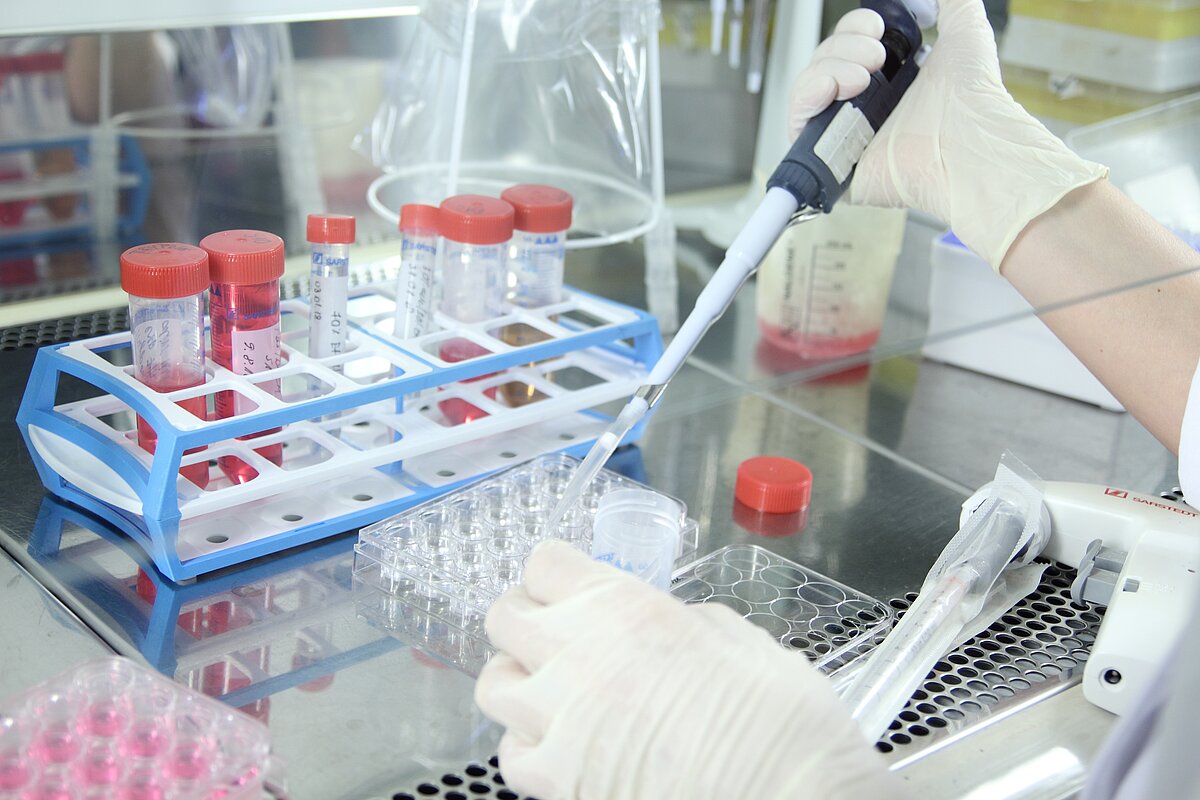
On August 28 successfully completed the clinical activities of the HYCOR project at the Liepāja Research Center in collaboration with the Institute of Clinical and Preventive Medicine of the University of Latvia (LU KPMI) and the Liepāja Regional Hospital.
The GISTAR project, a multicenter randomized trial focused on reducing gastric cancer mortality through H. pylori eradication and pepsinogen measurement, served as the foundation for the implementation of the HYCOR project. HYCOR, short for hybrid-sensor breath analysis for colorectal cancer screening, represents an innovative approach in our ongoing research to devise strategies for reducing gastric cancer mortality in high-risk areas. Within the GISTAR study, a total of 11,223 participants participated, with 842 individuals being part of the study center in Liepāja.
Invitations were extended to healthy individuals between the ages of 40 and 64 to voluntarily participate in this scientific endeavor. Study participants were required to complete a comprehensive questionnaire, covering lifestyle factors, prior medical history, and any health-related complaints. Subsequently, selected participants expressing interest were invited for further investigations. While participants were randomly chosen, diagnostic tests were strongly recommended for those in immediate need of medical attention. A specific group of participants underwent blood tests to identify signs of gastric atrophy, a condition associated with an elevated risk of stomach cancer, and an occult blood test in stool to identify patients at higher risk of colorectal cancer. Those testing positive (showing abnormalities) were encouraged to undergo endoscopic examinations.
Out of the participants, 35 individuals were identified as needing colonoscopies (lower endoscopies) due to positive occult blood test results, with 23 of them already examined. Simultaneously, 22 study participants were invited to undergo upper endoscopy, with 16 having undergone the procedure. All participants were informed of their endoscopic findings, and when necessary, were referred to the appropriate specialists.
Among the 842 residents who participated in the study, 206 were found to be infected with Helicobacter pylori, a bacterium associated with stomach cancer development. These participants were prescribed eradication therapy for the bacteria, which they will continue until the end of August.
Additionally, at the Liepāja research center, research participants underwent specialized breath measurements using a hybrid breath analyzer. The objective of this endeavor was to develop a mathematical model for colorectal cancer detection and evaluate the sensor performance of a specially designed device for this purpose. While this device currently cannot provide an accurate diagnosis, it is contributing to the development of experimental technology for potential colorectal cancer screening. It's important to note that active analysis of the collected data and interpretation of results are ongoing.
The scientists engaged in the GISTAR study emphasize the significant global impact of digestive system tumors, accounting for a substantial portion of worldwide cancer cases. Annually, there are 3.88 million new diagnoses of this disease, resulting in 2.83 million fatalities. Colorectal (colon and rectal) cancer and stomach cancer are the most prevalent among these tumors. Importantly, many of these cancer cases can be prevented through timely diagnosis, as most digestive system tumors, including colorectal and stomach cancer, respond well to treatment when identified early. GISTAR stands as a scientific endeavor aimed at contributing to the reduction of gastric cancer mortality.
[Photo: Toms Grīnbergs, LU Communication Department]

The project is funded by the ERDF (European Regional Development Fund) 1.1.1.1. project ‘Practical Studies’, 4th phase, project ID Nr. 1.1.1.1/20/A/035 ‘Hybrid-sensor breath analysis for colorectal cancer screening’. The project is co–financed by REACT-EU to mitigate the effects of the pandemic crisis.
On March 3, the inclusion of study participants in the dynamic control monitoring study of the cohort (EUROHELICAN and TOGAS projects) began at the Ludza research center.
The "Accelerating gastric cancer reduction in Europe through Helicobacter pylori eradication” project, or EUROHELICAN for short, is an EU-supported project under the EU4Health program. It will evaluate a population-based strategy for testing and eradicating the Helicobacter pylori bacteria. As a result of the project, world and European experts will develop guidelines for the introduction of gastric cancer screening and recommendations for evaluating its effectiveness. In Latvia, it is led by the Institute of Clinical and Preventive Medicine Institute of the University of Latvia in collaboration with the National Institute of Public Health of Slovenia (NIJZ), the International Agency for Research on Cancer of the World Health Organization (IARC/WHO, France), Nantes University Hospital (France), and the Community Healthcare Center Dr. Adolf Drolc Maribor (Slovenia). The project will continue until the end of April 2025.
More about the EUROHELICAN project - https://www.kpmi.lu.lv/lv-lv/petijumi-un-projekti/eurohelican
The project “Towards gastric cancer screening implementation in the European Union”, abbreviated as TOGAS, will begin in March 2023, with UL ICPM being the leading partner, collaborating with more than 20 institutions throughout Europe.

Funded by the European Union. Views and opinions expressed are however those of the author(s) only and do not necessarily reflect those of the European Union or European Health and Digital Executive Agency (HADEA). Neither the European Union nor the granting authority can be held responsible for them.
Where authors are identified as personnel of the International Agency for Research on Cancer/World Health Organization, the authors alone are responsible for the views expressed in this article and they do not necessarily represent the decisions, policy or views of the International Agency for Research on Cancer/World Health Organization.